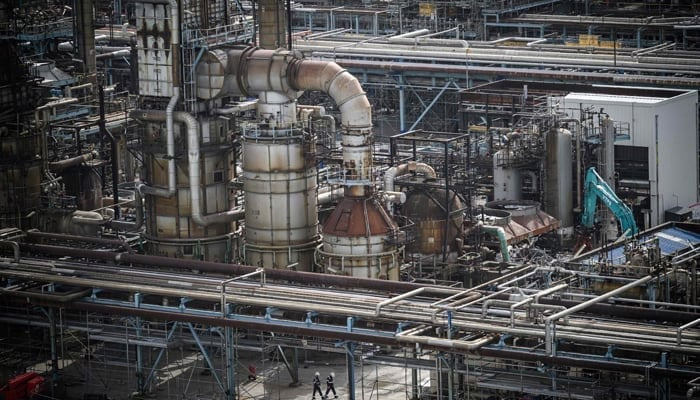Taxation dispute delays refinery upgrade deals under new policy
As deadline for signing of agreements will expire on Ja 16, 2024, both sides have to resolve issue of taxation escrow account
KARACHI: The refining sector is struggling to finalize agreements with the government for upgrading their facilities to produce cleaner fuels under a new policy, as a dispute over taxation remains unresolved, sources told The News on Monday.
As the deadline for the signing of agreements will expire on January 16, 2024, both sides have to resolve the issue of taxation escrow account. Under the policy, the release from the joint escrow account will be made on a pro rata basis, i.e. a maximum of 25 percent from the escrow account and 75 percent from the refinery’s own resources for the upgradation, and it will be audited by internationally reputed firms to ensure transparency and accountability.
However, Federal Board of Revenue (FBR) wants taxation on the release from escrow account, whereas the refining sector wants the government to consider it as a grant to avoid taxation. Industry offcials said any taxation on it would make it economically unfeasible for the refineries to go for upgradation.
Four refineries, Pak Arab Refinery Limited (PARCO), National Refinery Limited (NRL), Attock Refinery Limited (ATRL), and Cnergyico Limited, did not sign the agreements for their upgradation after raising issues over taxation, arbitration, force majeure, and import incentives, which they say are not in line with the announced policy. Only Pakistan Refinery Limited (PRL) signed the agreement in November last year. Cabinet Committee on Energy (CCoE) extended the deadline for signing of agreements by two months, which would expire on January 16, 2024.
The policy, which was notified on August 17, 2023, offered incentives and concessions to the existing refineries to invest in upgrading their facilities to produce Euro-V compliant fuels, which have lower sulfur content and are less harmful to the environment.
The policy required the refineries to sign an upgrade agreement with OGRA within three months, outlining their commitments, project milestones, and details. The policy was announced to attract $4-5 billion in investment in the refining sector, as the lack of investment in the refinery sector not only puts an additional burden on the foreign exchange reserves but also creates a significant dependency on imports.
The policy stated that a modern refining sector will not only boost the development of allied and downstream sectors of the economy but will also lead to industrial development, which is critical for economic growth. Furthermore, the modernization also benefits the end consumer, along with all the stakeholders, as productivity is optimized, and economic activity in nearby areas increases.
“We have been left with the taxation issue as other issues have been resolved. I hope that we will be able to resolve this issue in the next two to three days to move towards signing of upgradation agreements,” a top official of a local refinery said.
-
 Alexandra Daddario, Andrew Form Part Ways After 3 Years Of Marriage
Alexandra Daddario, Andrew Form Part Ways After 3 Years Of Marriage -
 Eric Dane Rejected Sex Symbol Label
Eric Dane Rejected Sex Symbol Label -
 Avan Jogia Says Life With Fiancee Halsey Feels Like 'coming Home'
Avan Jogia Says Life With Fiancee Halsey Feels Like 'coming Home' -
 Kate Middleton's Role In Handling Prince William And Harry Feud Revealed
Kate Middleton's Role In Handling Prince William And Harry Feud Revealed -
 Tucker Carlson Says Passport Seized, Staff Member Questioned At Israel Airport
Tucker Carlson Says Passport Seized, Staff Member Questioned At Israel Airport -
 Taylor Swift Made Sure Jodie Turner-Smith's Little Girl Had A Special Day On 'Opalite' Music Video Set
Taylor Swift Made Sure Jodie Turner-Smith's Little Girl Had A Special Day On 'Opalite' Music Video Set -
 Eric Dane Says Touching Goodbye To Daughters Billie And Georgia In New Netflix Documentary
Eric Dane Says Touching Goodbye To Daughters Billie And Georgia In New Netflix Documentary -
 Channing Tatum Reveals What He Told Daughter After Violent Incident At School
Channing Tatum Reveals What He Told Daughter After Violent Incident At School -
 King Charles Lands In The Line Of Fire Because Of Andrew Mountbatten-Windsor
King Charles Lands In The Line Of Fire Because Of Andrew Mountbatten-Windsor -
 Denise Richards Doubles Down On Abuse Claims Against Ex Husband Aaron Phypers Amid Show Return
Denise Richards Doubles Down On Abuse Claims Against Ex Husband Aaron Phypers Amid Show Return -
 Russia Set To Block Overseas Crypto Exchanges In Sweeping Crackdown
Russia Set To Block Overseas Crypto Exchanges In Sweeping Crackdown -
 Gwyneth Paltrow Reveals Deep Personal Connection With Kate Hudson
Gwyneth Paltrow Reveals Deep Personal Connection With Kate Hudson -
 Prince Harry, Meghan Markle’s Game Plan For Beatrice, Eugenie: ‘Extra Popcorn For This Disaster’
Prince Harry, Meghan Markle’s Game Plan For Beatrice, Eugenie: ‘Extra Popcorn For This Disaster’ -
 OpenAI To Rollout AI Powered Smart Speakers By 2027
OpenAI To Rollout AI Powered Smart Speakers By 2027 -
 Is Dakota Johnsons Dating Younger Pop Star After Breakup With Coldplay Frontman Chris Martin?
Is Dakota Johnsons Dating Younger Pop Star After Breakup With Coldplay Frontman Chris Martin? -
 Hilary Duff Tears Up Talking About Estranged Sister Haylie Duff
Hilary Duff Tears Up Talking About Estranged Sister Haylie Duff




